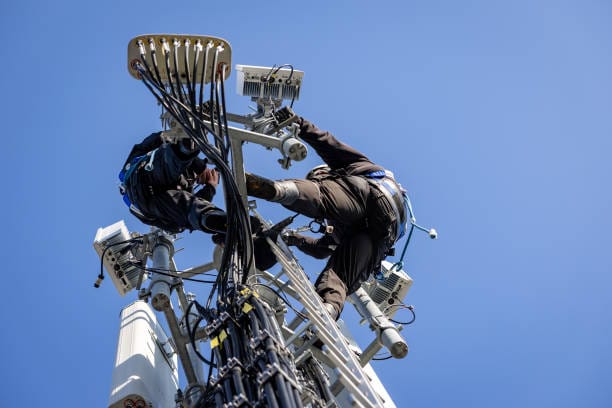
21 January 2025, Telekom technicians carry out repair work on an active 5G antenna (3.6 Ghz) on a mobile phone mast. Photo: Daniel Karmann/dpa (Photo by Daniel Karmann/picture alliance via Getty Images)
Abuja, Nigeria (EPICSTORIAN) – Nigeria’s telecommunications sector is set for a major shift as telecom operators prepare to implement a 50% tariff increase by March 2025.
This follows approval from the Nigerian Communications Commission (NCC), with operators citing rising operational costs and economic sustainability as key factors driving the hike.
Despite the NCC’s directive that the increase should take effect from February, service providers say the rollout will be fully implemented in March as they finalize regulatory procedures.
The decision has sparked backlash from labor unions, with the Nigeria Labour Congress (NLC) and Trade Union Congress (TUC) calling for mass protests on February 4, demanding a reduction of the tariff hike to 5% instead.
Operators Justify Tariff Hike
At a weekend briefing in Lagos, telecom executives engaged journalists and industry stakeholders, emphasizing that the price adjustment was essential for the sector’s survival rather than an attempt to maximize profits.
Leading the discussions, Gbenga Adebayo, Chairman of the Association of Licensed Telecom Operators of Nigeria (ALTON), stressed that telecom services should not be treated as a subsidy for other sectors.
“We are following the regulatory process of filing, reviewing, and obtaining approvals. Once finalized, each operator will introduce new rates at different times,” Adebayo explained. “Over the next week, we will begin to see adjustments in pricing.”
He further highlighted the disproportionate economic burden placed on telecom providers, arguing that rising living costs in Nigeria should not translate into expectations for the telecom industry to absorb expenses.
“Our costs must reflect the realities of the economy. Telecom services cannot serve as palliatives for economic hardships. If the price of garri, pepper, and okro rises, it does not mean we should operate at a loss,” he stated.
Investment and Market Forces in Play
Femi Adeniran, Director of Corporate Communications and CSR, reaffirmed that telecom providers have continued to invest in service improvements, but the tariff adjustment would enable further expansion and innovation within the sector.
Similarly, Kenechukwu Okonkwo, Director of Product Innovation and Business Development at 9mobile, emphasized that tariffs should ultimately be dictated by market dynamics rather than government-imposed controls.
“We hope economic conditions improve to prevent further hikes, but market forces will always play a role in pricing,” Okonkwo said.
Unresolved USSD Debt Between Banks and Telcos
On the long-standing Unstructured Supplementary Service Data (USSD) debt dispute between telecom operators and Nigerian banks, Adebayo confirmed that progress was being made toward a resolution, though specific details were not disclosed.
Public Reaction and Protest Plans
The implementation date approaches, and public outrage and resistance from labor unions continue to mount. The NLC and TUC have vowed to mobilize mass protests across Nigeria on February 4, demanding a drastic reduction in the tariff adjustment.
With the cost of living already at an all-time high, consumer advocacy groups argue that the hike will further strain household budgets and widen the digital divide, making internet access unaffordable for many Nigerians.
These concerns persist, but telcos remain firm in their stance, insisting that operational sustainability requires cost-reflective pricing. Whether the government will reconsider its approval of the 50% hike remains to be seen.







